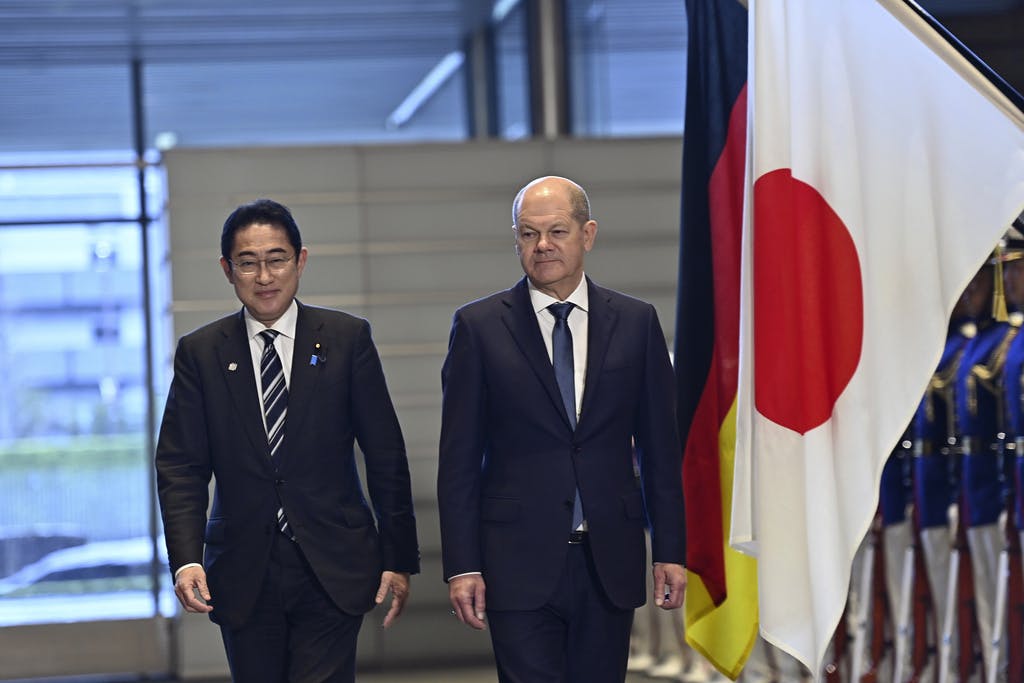Enemies in World War II Now Providing America With Vital Backing Against Today’s Foes
A display of close cooperation between Japan and Germany provides a dramatic counterpoint to the summit at Moscow between the Russian and Chinese strongmen.

America’s worst enemies in World War II now form a bulwark against America’s worst foes in both Europe and Asia.
The leaders of Japan and Germany, meeting at Tokyo, agreed on the importance of building up their own historically powerful military structures, citing the need to counter the Russians in Ukraine and to join in fulfilling their mutual vision of defense in Asia against China.
“Japan and Germany shared the recognition that the security of Europe and that of the Indo-Pacific are closely interlinked,” the statement signed by Japan’s prime minister, Fumio Kishida, and the German chancellor, Olaf Scholz, said. Both sides, they said, “strongly oppose any unilateral attempts to change the status quo by force or coercion that increase tensions.”
The display of close cooperation provided a dramatic counterpoint to the summit at Moscow at which Russia’s president, Vladimir Putin, is hosting China’s president, Xi Jinping, in a desperate bid for whatever aid he can get to support his beleaguered forces in Ukraine.
In a display of their mutual hostility toward America, China and Russia refused to join in a discussion by members of the UN Security Council about human rights in North Korea. They have both either vetoed or abstained from Security Council votes condemning North Korea for its nuclear program.
North Korea on Monday said it had fired a missile Sunday to test its ability to deliver a nuclear warhead on target during war games being staged by American and South Korean forces. An American B1 bomber and F-35 stealth fighters joined in the exercises in response to escalation of testing ordered by the North’s leader, Kim Jong-un.
President Biden expressed misgivings about the Putin-Xi meeting while Messrs. Kishida and Scholz were talking about mutual defense. The Americans, bound in alliance to both Germany and Japan, had to be happy about their leaders dedicating themselves to mutual military as well as economic cooperation. America has vital military bases in both countries.
The wording of the Scholz-Kishida statement came close to binding the two in de facto alliance nearly 78 years after both their countries, under the thumb of bloodthirsty dictators, surrendered to allied forces, including the United States and the Soviet Union.
“Japan and Germany reiterated their commitment to fostering cooperation between Japan Self-Defense forces and the German Federal Armed forces,” the statement said. They had decided, the statement went on, “to make efforts to establish a legal framework for bilateral defense and security cooperation activities.”
The agreement between Japan and Germany extended beyond strictly military defenses to ways to combat what they saw as “economic coercion” by both China and Russia. Mr. Kishida said they had resolved to cooperate against “state-led attempts to illegally acquire technology” and engage in “non-market practices.”
Together, Mr. Kishida said, Japan and Germany as “industrial nations” sharing “fundamental values” should “strengthen the resilience of our societies.” The importance of the summit was evident not only in formal words but in talks between ministers, with authority for defense and a range of economic fields.
On Monday, while Japanese and German ministers were still discussing ways to cooperate, Mr. Kishida said Japan would invest vast sums in development projects across the Indo-Pacific region. The message was clear: Japan is ready and able to pour billions of dollars’ worth of aid into countries from South and Southeast Asia to the South Pacific in direct competition with China.
Not surprisingly, China was not happy about the Tokyo summit.
“Analysts warned that any attempt to push decoupling from China may meet with obstacles,” the English-language Global Times, published by China’s party newspaper, People’s Daily, said, decrying what it called “Japan’s move to introduce more interference” from the European Union into Asia.
The result, the paper said, would be to “drag the region into turbulence, against which regional countries should be highly vigilant.”

